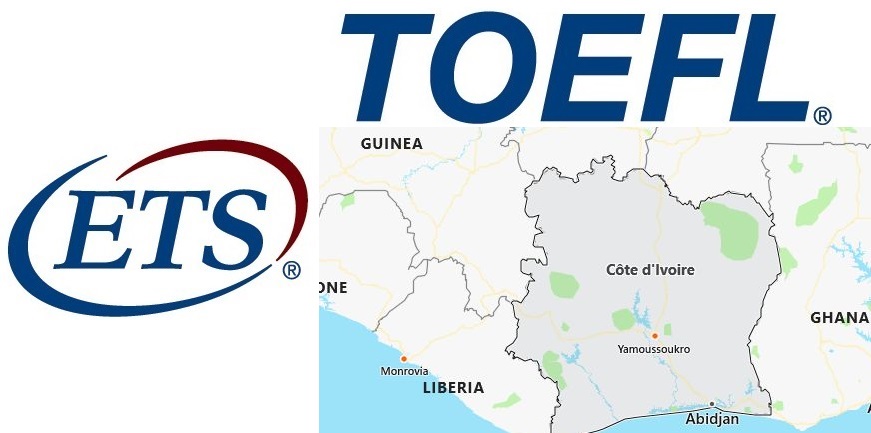The TOEFL iBT test is offered in this location.
The list below shows testing regions, fees and dates as of February 15, 2019, but availability may change when you register. Fees are shown in US$ and are subject to change without notice.
| Region | Testing Format | Fee | Test Dates |
|---|---|---|---|
| Abidjan | TOEFL iBT | $180 $180 $180 $180 $180 $180 $180 $180 $180 $180 $180 |
Fri., Mar 08, 2019 Fri., Apr 05, 2019 Sat., Apr 13, 2019 Sat., May 04, 2019 Fri., May 10, 2019 Sat., May 18, 2019 Sat., Jun 01, 2019 Sat., Jun 15, 2019 Fri., Jul 12, 2019 Sat., Jul 13, 2019 Sat., Jul 27, 2019 |
Ivory Coast Overview
Ivory Coast (French Côte d’Ivoire), republic in West Africa, the population is made up of over 60 ethnic groups. A highland connects to the coastal plain with many lagoons. The tropical rainforest in the south turns into savannah in the north. Crude oil has been produced off the coast since 1980. The most important export goods are coffee, cocoa and wood; the most important port is Abidjan.
History: Before the colonization by France in the 19th century, the area belonged to different empires (Mali, Ashanti). From 1895 the national territory was part of French West Africa. In 1960 the Ivory Coast state became independent.
Country facts
- Official name: Republique de Côte d’Ivoire
- License plate: CI
- ISO-3166: CI, CIV (384)
- Internet domain:.ci
- Currency: CFA franc
- Area: 322 460 km²
- Population (2019): 25.7 million
- Capital: Yamoussoukro
- Official language (s): French
- Form of government: Presidential Republic
- Seat of government: Abidjan
- Administrative division: 12 districts, 2 autonomous city districts
- Head of State: President Alassane Ouattara (since December 4, 2010)
- Head of Government: Hamed Bakayoko (since July 30, 2020)
- Religion (s) (2014): 43% Muslims, Christians (17% Catholics, 12% Evangelicals, 2% Methodists, 3% other Christians), 19% non-denominational, 4% followers of traditional local religions, others / not specified
- Time zone: Central European Time -1 hour
- National holiday: August 7th
Location and infrastructure
- Location (geographical): West Africa
- Position (coordinates): between 4 ° 30 ‘and 10 ° 45’ north latitude and 2 ° 30 ‘and 8 ° 35’ west longitude
- Climate: Humid tropical savanna climate
- Highest mountain: Mt. Nimba (1,752 m)
- Road network (2007): 6 502 km (paved), 75 494 km (unpaved)
- Railway network (2008): 660 km
Population
- Annual population growth (2020): 2.3%
- Birth rate (2020): 29.1 per 1000 residents.
- Death rate (2020): 7.9 per 1000 residents.
- Average age (2020): 20.3 years
- Average life expectancy (2020): 61.3 years (men 59.2; women 63.6)
- Age structure (2020): 38.5% younger than 15 years, 2.9% older than 65 years
- Literacy rate (15 year olds and older) (2018): 47.2%
- Mobile phone contracts (pre-paid and post-paid) (2018): 135 per 100 residents
- Internet users (2018): 47 per 100 residents
Economy
- GDP per capita (2019): US $ 1,691
- Total GDP (2019): US $ 44 billion
- GNI per capita (2019): US $ 2,290
- Education expenditure (2018): 4.4% of GDP
- Military expenditure (2019): 1.1% of GDP
- Unemployment rate (15 years and older) (2019): 3.3%
Education
The education system is nationalized and the school system is organized according to the French model. There is general compulsory schooling for six years from the age of 6. The six-year primary school is followed by a seven-year two-stage secondary school education. Attending public schools is free. The language of instruction is French. The private schools are mainly attended by European students. There are several colleges including the Université de Cocody in Abidjan and the Université de Bouaké; also a polytechnic in Yamoussoukro with affiliated academies (Grandes Ecoles). Many students study abroad, most of them in France.
Media
Freedom of the press is protected by the constitution. The media landscape is diverse, but reporting critical of the government must expect repression.
Press: The most important daily newspapers are »Fraternité Matin« (state), »L’Inter / Soir Info«, »Le Jour«, »Notre Voie« and the party newspapers »Le Nouveau Réveil« (PDCI-RDA) and »Le Patriote« (RDR).
News agency: Agence Ivoirienne de Presse (AIP, state).
Broadcasting: The state Radiodiffusion-Télévision Ivoirienne (RTI, founded in 1962) operates two radio stations. There are also private and numerous local radios. »Radio France International« (RFI), »Radio Africa No. 1 «, also from France, and received the BBC. “La Première” and “TV2” are RTI’s television channels. The South African pay-TV broadcaster DStv broadcasts via satellite, another foreign broadcaster is the French “TV 5 Monde”.
Religion
The constitution guarantees freedom of religion. All religious communities are legally equal. Almost 43% of the population are Muslims (Sunni of the Maliki school of law), around 34% Christians and around 4% followers of traditional African religions. Islam, which is widespread in the north of the country, is the fastest growing religious community. A good 17% of the population are members of the Catholic Church (four archbishoprics with 11 suffragan dioceses). In 1990 Pope John Paul (John Paul II) consecrated Yamoussoukro houses the largest church in Africa (Notre Dame de la Paix), which was built on the model of St. Peter’s Basilica in Rome. The remaining Christians belong to various (post-) Reformation faith communities (Evangelicals [approx. 12%] and other Protestants) or independent churches. About 19% of the population cannot be assigned to any religion.

